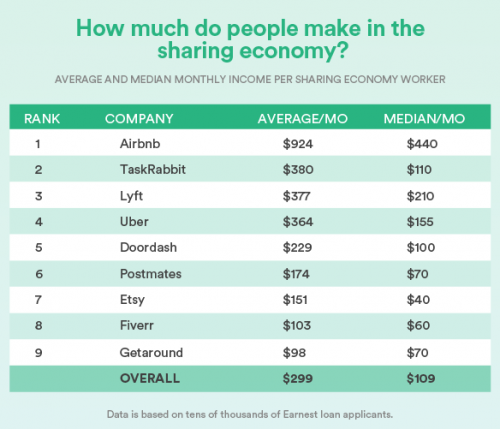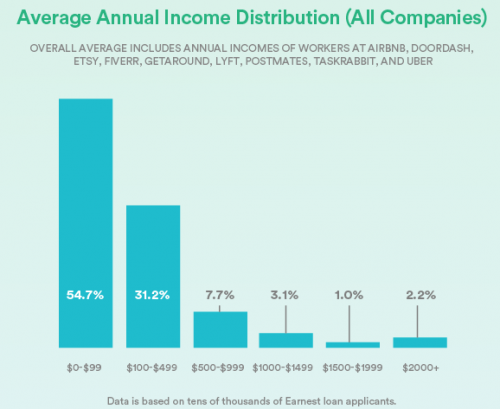Everyone is getting rich in the Gig Economy
Bloomberg had a provocative article the other day titled Six-Figure Earners Are a Growing Share of U.S. ‘Gig’ Workforce.
While the number of self-employed Americans working at least 15 hours per week on a consulting, freelance, contract, or on-call basis fell this year by 700,000 to 16.2 million, the portion of those independent workers earning over $100,000 per year hit a new high, jumping 4.9 percent to 3.2 million, according to an annual survey released Tuesday by MBO Partners, Inc., a Virginia-based group which provides business services to independent contractors. The share of so-called “high-earning independents” is up over 60 percent in figures going back to 2011.
...It’s not just high-priced consultants pursuing alternative work arrangements. The survey separately found an increase in the number of traditionally-employed workers taking on occasional side projects to help supplement their income, supported in their search for part-time work by new online platforms and apps from the likes of Uber Technologies Inc. and TaskRabbit Inc.

Like most economic articles the trick is finding the omission, the carefully implied falsehood, and the buried truth.
This article has all three of those.
The carefully implied falsehood is represented in the second paragraph above: "The survey separately found an increase in the number of traditionally-employed workers taking on occasional side projects to help supplement their income".
You see, the growth in high earning independent contractors has NOTHING to do with what you and I normally associate with the 'gig' economy.
The buried truth is near the bottom of the article.
Yet on-demand jobs often lack the safety net of benefits and wage protections associated with traditional work arrangements. A 2015 report by the Government Accountability Office found that independent work tends to lead to fewer employer benefits and a greater dependence on public assistance than standard work.
In other words, the gig economy leads to workers on food stamps.
Finally, there is the omission - what people are actually earning in the gig economy.
Fortunately, I can answer that.
We found that 85% of side-gig workers make less than $500 a month. And of all the side-gig platforms we examined, Airbnb hosts earn the most by far.


The gig economy is now 34% of the workforce, and that's a huge percentage of the workforce unable to make a decent living.
Nearly 20 million gig workers do the work because they can't find better pay or jobs elsewhere, McKinsey found.

Aren't we long past due for questioning how our economy works?


Comments
The robots and the
common-sense expectation that the financial economy is in a very burstable bubble will provide a real challenge to pretending things are just roses for the propaganda machine. "Don't believe your wallet."
Orwell: Where's the omelette?
Well at first glance there is something romantic and freeing
About the gig/sharing economy. Smashing the gatekeepers, the taxi medallions, the expensive commercial retail brick and mortar space the disintermediation of the rentier class and all that. I've sold a lot of books over the years. The rent alone on my used book store over 35 years added up to over 2 million dollars. We're talking about a modest used book store in a small coastal California town. There is a certain relief to being able to turn the bookstore over to my son and just sell books on line thru Amazon. Know their extractionary ways I don't trust them at all. It's relationship of convenience. I give them 20% about 15,000 a year for their use of their site and a bang up site it is and they help a retired bookseller make his way in the world. THIS wasn't available when I started in the book business. Back then you couldn't get a job in a used bookstore if you didn't have any experience...you could only get experience if you worked in a used bookstore. catch 22. It takes skills to buy used books. NOW there are bar code readers and apps that tell you what books are worth.
This it true for many jobs in the gig economy. Eliminating the middleman. telling you where the ride is, who wants your bnb. Etc. For the last decade of working behind the counter at my store I turned down one college kid a day asking for a job. I had 3 employees they all wanted to stay. Turnover was once every 24 months at most. This was for a relatively easy but dead end job of book clerking.
So I like the gig economy, but I hate it. I tried for a long time to tell all these aspiring book clerks they could start their own virtual bookstore on line no brick and mortar overhead. There is even an app for it.
Things change. Those apps went along way in crushing 40 years of bookseller knowledge to less than zero. Now anybody could see what a book might be worth. Fortunately while the knowledge gap has changed and been reduced experience still counts for something.
On a macro level the gig economy is a cannibalization and a leveling of experience of the old economy. Yes it provides opportunity for some. But in the end It is a techno Leninesque leveling of what came before. It is also the social Darwinist capitalist ENDGAME.Global bubble creating credit creation is nearing entropy...even google employees can't afford SF real estate. Ice nine (faltering of trust and credit freeze up...2008 on steroids ) is near. Figure out what is working for you... Armor up, watch your back.
The "gig economy" is
made for retirees looking for an extry $350 /mo. to help make ends meet, or college kids looking for pizza money. perfect for me if I can find the right one. For everybody else not so much.
the little things you can do are more valuable than the giant things you can't! - @thanatokephaloides. On Twitter @wink1radio. (-2.1) All about building progressive media.
I think . . .
that you're selling your books and mortar self short. I now live in a college town where the few used book stores carry what students sell. When I lived in a larger city and had access to what I consider a book dealer, the person got to know me. I'd stop by regularly to see what was new. We had a nice talk. (There is a growing dearth of human interaction that I think plays a role in a number of social problems.) Usually, the dealer would pull out a couple of books (just books, not collector editions) and say "You might like these." The dealer's judgment was far superior to what Nook and Kindle come up with based on my prior purchases.
I suspect a lot of people miss you.
It's worse than that
airbnb only works if you have a place to offer. Lyft and Uber only work if you have a car, so drivers probably don't even make their vehicle upkeep. It might be effective if you (were) well off and want to just supplement your income, but for someone who actually wants a job the gig economy is just a fraud.
On to Biden since 1973
Yes it often comes down to that
more work ...less pay. Debt serfs unite!
Etsy is on that list? Guess I
Etsy is on that list? Guess I'm somewhat confused. I don't know, I've gotten some things on Etsy. Always just thought it as various artists and people finding an outlet to sell their things. I guess I never thought of that as "gig economy" or "sharing economy" (also sharing economy? what's that?)
Many sellers on ebay, etsy, etc. work
at it full time, going to flea markets, yard sales, etc. to acquire merchandise. Some craft the things they sell. Some re-sell new stuff they've bought in bulk. Some also have their own online and brick and mortar shops.
Officially it's a Silicon Valley term
Sharing economy is an umbrella term with a range of meanings, often used to describe economic and social activity involving online transactions. Originally growing out of the open-source community to refer to peer-to-peer based sharing of access to goods and services,[1] the term is now sometimes used in a broader sense to describe any sales transactions that are done via online market places, even ones that are business to business (B2B), rather than peer-to-peer. For this reason, the term sharing economy has been criticised as misleading, some arguing that even services that enable peer-to-peer exchange can be primarily profit-driven.[2] However, many commentators assert that the term is still valid as a means of describing a generally more democratized marketplace, even when it's applied to a broader spectrum of services.
Also known as shareconomy, collaborative consumption, collaborative economy or peer economy, a common academic definition of the term refers to a hybrid market model (in between owning and gift giving) of peer-to-peer exchange. Such transactions are often facilitated via community-based online services.[1][3] Uberization is also an alternative name for the phenomenon.[4]
But I have heard it used by millenials to mean couch surfing, gift economy, car pooling, cat sitting , barter, where money isn't the primary concern.
"Sharing economy"
There's some crossover with the "gig" economy, but in general, it's people sharing things they have (extra bedrooms, a car) with others for the chance to make some cash.
In theory it sounds great -- so long as it's not exploitative. I agree with Song of the Lark; I like it, and I hate it. I think people should be able to do whatever they want with their own property, and it's helpful that technology platforms exist to connect supply and demand. But these companies are getting the much, much better end of the deal and the workers are getting stiffed.
Take Uber. We used it once -- once -- from the airport, and decided never to use it again when we learned our driver was a Palestinian refugee who had been a dentist at home and now was making $1 per mile. Believe me, I love that Uber and Lyft have smashed the whole taxi medallion racket, but the drivers aren't the ones benefiting. Not to mention the additional surrender of riders' privacy, since you have to activate your cell phone location services in order to use it.
(I will admit to being a frequent user of Airbnb, so I am aware of my own hypocrisy -- but that company seems less problematic for some reason. Perhaps I just fool myself into thinking that those who offer their space truly do it "on the side," and get employee benefits at their day job).
Sigh.
I prefer the "true" version of the "sharing ecomony"
In which -- as a real example -- our neighbors bought a lawn mower which we then used each week, covering the cost of gas and maintenance. No technology needed, just a friendly conversation and a handshake. (Why should we both purchase lawnmowers when one would suffice? we collectively reasoned).
Acquaintances of ours had a similar arrangement: sharing their car with neighbors in exchange for gift cards to the local co-op.
@WaterLily Renting is not
Renting is not sharing. A group may jointly buy something and share the use (and ownership) of it. But as I see it sharing implies a lack of a business relationship in the activity. The local grocery store and gas station don't share their products with me, they expect to be paid. That's no different from Uber/Lyft/AirBnB, there's no "sharing" going on.
I reada newspaper article that
that said that hedge funds were buying up apartments so that they could hawk them on airbnb - they could make more money that way.
On to Biden since 1973
Sadly,
This does not surprise me.
A lot of the umbrella corps of the gig economy
are fairly sophisticated extraction schemes. I know Amazon has made a couple hundred thousand off me in a decade and a half and I have never once spoken to an Amazon employee on the phone. I did get in a live online chat with someone probably in India ( from his name) and the conversation one time when I was having a postage buying problem.
I know that Uber is bleeding out cash like a gunshot victim. 700 million last quarter. I used to think Netflicks and Amazon would go down because of their thin margins. But Netflicks is bigger than most cable companies, and Amazon just threw some of their pocket change and bought Whole Foods. These companies will prosper until the economy crashes. When that is I don't know ,but the central banks have blown a MOAB "mother of all bubbles". Who knows when the prick to pop it will come. But I believe it will be like a balloon popping , a loud noise and some balloon juice spittle in your face. Trillions in asset value will vaporize in a virtual instant.
Freedom!
....to be exploited.
The real SparkyGump has passed. It was an honor being your human.
Freedom's just another word in some circumstances per music
Freedom's just another word
at least in some circumstances,
as explained in this music video updating an old standby:
https://www.youtube.com/watch?v=2Q0BdgnFgfU
The gig economy works for me.
My Internet store went close to belly up during the Bush Recession. I was near bankruptcy in 2014. Things were so bad I sold my wedding ring for the gold content, my wife sold her jewelry, and we were planning to abandon our house and move in with her sister.
Then, in 2015, I started doing freelance work through an online company now known as Upwork (a merger of Odesk and Elance). I do technology and marketing consulting. I'm not pulling in anywhere close to 6 figures, as its only part-time, but I'm finally earning enough to refinance our mortgage and pull out some cash to buy a car after not having one for two years. (Rural area, little or no public transportation.)
The downside is no benefits except what I can afford to give myself. Obamacare is unaffordable ($14,000 per year!!) and they want me to pay the non-coverage tax. Days off equal days with no pay. No retirement except what little I can put aside for myself.
The gig economy can work for some of us. I enjoy working from home and keeping myself challenged with new technology. It's not for everyone, but for me it's been a great alternative to the hundreds of traditional jobs I applied for and never got. Age discrimination? At age 61, who knows?
Interesting post, thanks. I've often thought the gig economy is
a scam for the reasons you cited. I did not realize that it comprised that large of a percentage of the workforce. It's all about driving down wages and benefits. I have a friend that has a gig doing translation. For her and her husband, who schedules her appointments, and who are both retired, it seems to work well. But for people who already have regular jobs, WTF is the point of life if you have to work all the time just to survive? We need universal basic income, NOW!
"Those who make peaceful revolution impossible will make violent revolution inevitable." - JFK | "The more I see of the moneyed peoples, the more I understand the guillotine." - G. B. Shaw Bernie/Tulsi 2020
The Gray Market
As a play on the words "Black Market", the Gray Market (as in not really illegal) was in the past a useful way to supplement your income during (usually intermittent) times of "temporary embarrassment" as the rich would say. Of course, for some the legitimate and gray markets have always been out of reach, but that is another story.
Now as we all spiral down the porcelain convenience the Gray Market is becoming the norm that will soon become the nostalgic "good ol' days". I wonder, will there be any bread lines and soup kitchens to soften the blow as we hit the bottom of the abyss?